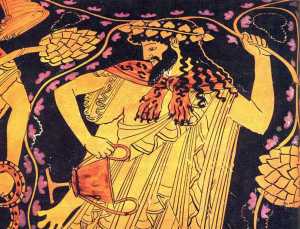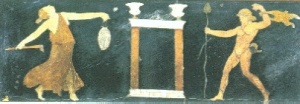Cultural Cocktail Hour
Review: Camerata Pacifica’s September concert

In his groundbreaking 1872 work The Birth of Tragedy from the Spirit of Music, Friedrich Nietzsche connects musical structures with two ancient deities, Apollo and Dionysus. The Apollonian and Dionysian framework allude to Apollo, the fair-haired Greek and Roman god of music, prophesy, and the sun. His errant half-brother, Dionysus, also known as Bacchus, held court as the god of wine, theater, fertility, and ecstasy.

Apollo represents the paragon of classicism- order, harmony, and control, while Dionysius stands as the paragon of Romanticism- emotional expression, expansion of formal structures, and lyricism. The Camerata Pacifica, with their vibrant interpretation of Bach, Haydn, and Dvorák at the Huntington’s Friends Hall proved that this chamber music ensemble more than holds its own with both the sun and wine divinities. However, the ensemble’s powerful performance of Dvorák’s Piano Quintet No. 2 in A Major, Op. 81 demonstrates that a Romantic repertoire provides the best medium through which Camerata Pacifica can showcase the talent of its gifted members.
Throughout their interpretation of J.S Bach’s Orchestral Suite No. 2 in B Minor, BWV 1067, one could feel the group’s vigorous energy brimming underneath the surface of the Baroque piece, like the momentum gathering in the Summer of Vivaldi whom many scholars hail as an influence on Bach’s lighter works.

If Bach’s Orchestral Suite represents a calm Apollonian summer, Piano Quintet No. 2 in A Major, Op. 81 parallels the driving storms in Vivaldi’s Winter.
This Romantic, Dionysian piece rejects orderly time distribution and swings between the melancholy Dumka and the spirited Scherzo, highlighting the violins, viola, piano, and cello during haunting moments of individualized expression. The tightly united quintet consisted of Violinists Catherine Leonard and Tereza Stanislav, Violist Richard Yongjae O’ Neill, Cellist Ani Aznavoorian, and Pianist Warren Jones who earlier demonstrated virtuosic sensibility in his poignant and playful interpretation of Haydn’s Piano Sonata in E-Flat Major, H XVI.
Dvorák’s piece elicited three standing ovations from a stirred audience, similar to the electrified reception garnered by another Romantic piece, Grieg’s Sonata for Piano and Cello in A Minor, Op. 36, performed by Camerata Pacifica in May. This rousing endorsement provides all the more reason for the Camerata Pacifica to immerse themselves in the Romantics. Not only does Dionysian music allows the musicians to unleash their instruments and rain musical tempests, it permits the audients to take part in the transforming Dionysian rites and leave the performance enraptured.














